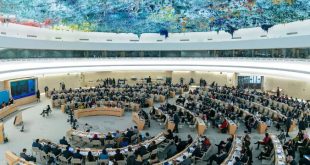I can't help but wonder why folks are so afraid to call the mass shooting in Tucson, Arizona an act of terrorism.
The fear of the "T" word seems almost palpable in describing the gruesome events that took place this past Saturday. There is little explanation or reasoning for the omission, except that it's very obvious what most Americans won't call 22-year-old Jared Loughner. It goes without saying that the man is deranged. Fairly obvious that he's unstable. But, tell us what we don't know. Get straight to the core of the matter here. Let's not fool ourselves and everyone else struggling to make sense out of it. Loughner is a terrorist, clearly fit within the strictest definition of the term.
While other top public officials tip-toed around it, Secretary of State Hillary Clinton almost went there, just short of dropping the "T" word. Instead, she chose "extremist." While clearly holding back, it was one of the braver rhetorical stands we've heard in the past few days. Her comparison to the Middle Eastern "extremism" we routinely see plastered on global headlines is sure to raise a few brows and 'how-dare-she' remarks back home, especially since she said it while in Abu Dhabi.
But, let's keep it real. The "T" term gets quickly applied within every second a suicide bomber blasts a busy street corner in Pakistan or when a crowded European commuter train is vaporized. We find some sort of geopolitical logic, however violent and horrific, to explain the indiscriminate mass killings of innocent civilians in various corners of the world. Even before responsibility is investigated or admitted by some obscure political fringe group wanting their spot blown, we're already using the "T" word.
When a "crazy" white guy with a gun, wound up on polarized talking points and manifestos, indiscriminately kills innocent Americans in broad daylight, it takes several days in the aftermath before the larger public will even accept a hint of premeditation. Typically, the collective American psyche will initially trivialize the event by calling the perpetrator "deranged" or "mentally unstable." The social response script is fashioned to fake us into a false sense of security. It's isolated, they say. Just one crazed nut with a gun.
That dude who flew his plane into an IRS building? Isolated. Or the cat who waited for, scoped, then killed three Pittsburgh police officers? Crazy. What about the man who shot at the Panama City school board then shot himself? Off the edge.
Brown skin man with bombs strapped to his torso? Oh, that's a terrorist.
Yet, in every instance, the "isolated" or "crazed" Americans each expressed some form of political reasoning for committing the act. Loughner, whose elaborate musings are outlined in lengthy Internet entries on MySpace and YouTube, was apparently hanging with anti-government dudes who probably have posters of Sarah Palin in a bikini brandishing a semi-automatic prior to the attack.
So, what's the difference between a mass political killing in Tucson, Arizona and the same in Any Town, Middle East?
Part of it is that we don't want to accept that Americans are actually capable of politically motivated destruction. Clearly, the level of invective in our political discourse has reached a feverish pitch in recent years, matched by the worrisome lack of civility and old fashioned decency we use to pride ourselves on. It's another conversation, but we're much meaner, much more hyper-competitive and much less compassionate — some can fairly argue with that assessment, especially after 400 years of slavery and institutional racism peppered by mass lynching. We don't want to admit it, but we all talk about how foul our social attitude is these days.
But, as we enter this 150th Anniversary of the Civil War, we are afraid to accept the comparisons. While the North vs. South battle lines disappeared with every history lesson, we can see a scary repeat of similar passions which led to the first cannon shots at Fort Sumter in 1861. Congress, in the 1850s, was also a scene of unadulterated political mayhem, Members beating each other senseless on the House floor and Senators drawing guns on one another. While it's not that bad today, we are seeing an alarming deficit of decorum in the House chamber which, if left unchecked, could lead to unbridled outbursts of ideology we'll end up regretting one day.
We'd be irresponsible not to reassess our national discourse. There are serious consequences to the ideological bubbles we've created while we self-isolate ourselves in Facebook profiles and Twitter accounts, interacting only with those we agree with.
Disagreeing is our national legacy and right, but how we disagree is a national discipline we should embrace before Tucson becomes the norm rather than the exception.
 Sri lanka Muslims Web Portal Diversity and Inclusiveness
Sri lanka Muslims Web Portal Diversity and Inclusiveness



